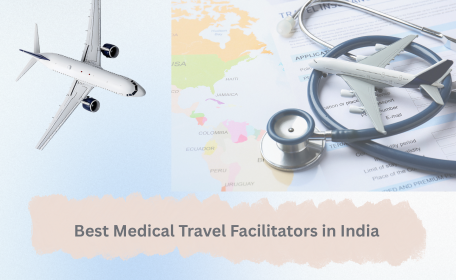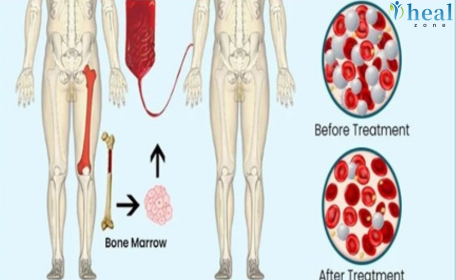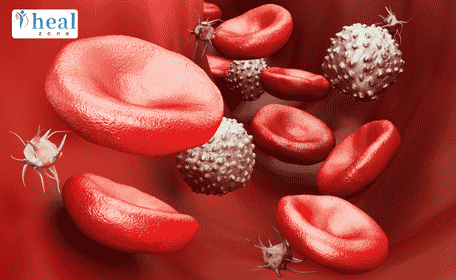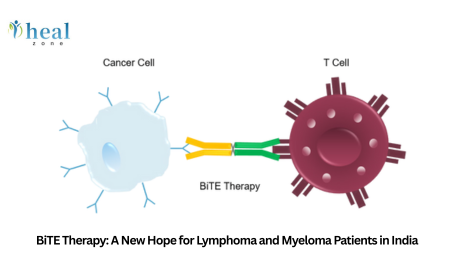What Is a Haploidentical (Half-Match) Bone Marrow Transplant?
A haploidentical bone marrow transplant is a type of allogeneic hematopoietic stem cell transplant in which the donor shares 50% of the recipient’s HLA (human leukocyte antigen) markers. This makes it possible for patients to undergo a transplant using a partially matched family member when a fully matched sibling or unrelated donor is unavailable.
Key Points:
- Donor is usually a parent, child, or half-matched sibling
- Increases chances of finding a donor within family
- Uses advanced immunosuppressive protocols to prevent rejection and graft-versus-host disease (GVHD)
This method has greatly expanded access to transplants for patients worldwide, especially those from ethnic minorities or underrepresented donor groups.
How Does a Haploidentical Transplant Work and Who Is Eligible?
In a haploidentical BMT, donor stem cells are collected and infused into the patient after intensive conditioning (chemotherapy/radiation). Modern techniques ensure the patient’s immune system accepts these half-matched cells.
Eligibility Criteria:
- No fully matched donor available (sibling/unrelated)
- Diagnosed with leukemia, lymphoma, aplastic anemia, or other serious blood disorders
- Patient is fit for myeloablative or reduced-intensity conditioning
- Availability of a biological parent or child as donor
Who is not eligible?
- Patients with multi-organ failure
- Active uncontrolled infections
- Severe cardiac or pulmonary impairment
Indian transplant teams conduct rigorous pre-BMT evaluations to ensure safety and suitability.
What Are the Differences Between Haploidentical, Matched Sibling, and Unrelated Donor Transplants?
|
|
|
|
|
|
|
|
|
|
|
|
|
|
|
|
|
|
|
|
|
|
|
|
Haploidentical BMT removes donor search delays and expands transplant options, especially for patients without sibling matches.
Which Diseases Are Treated with Haploidentical BMT in India?
India’s advanced transplant centers successfully use haploidentical BMT to treat a wide range of malignant and non-malignant hematological diseases.
Malignant Disorders:
- Acute lymphoblastic leukemia (ALL)
- Acute myeloid leukemia (AML)
- Chronic myeloid leukemia (CML)
- Hodgkin and Non-Hodgkin lymphoma
- Myelodysplastic syndromes (MDS)
Non-Malignant Disorders:
- Severe aplastic anemia
- Thalassemia major
- Sickle cell disease
- Congenital immunodeficiency disorders (SCID, Wiskott-Aldrich Syndrome)
Pediatric Indications:
- Neuroblastoma
- Metabolic disorders
India’s BMT protocols follow international standards from EBMT, ASBMT, and NMDP, ensuring safety and excellent outcomes across age groups.
What Is the Step-by-Step Treatment Protocol for Haploidentical Bone Marrow Transplant in India?
The haploidentical transplant process in India follows a systematic and multidisciplinary approach to ensure optimal outcomes.
1. Donor Evaluation & Matching:
- HLA typing to determine 50% match
- Basic health check, viral testing, blood compatibility
- Infectious disease clearance
2. Patient Pre-Transplant Evaluation:
- Complete blood count, kidney/liver function, echocardiogram
- Pulmonary function test (PFT)
- Bone marrow biopsy
- Chest X-ray, CT scans
- Viral screening (CMV, Hep B/C, HIV)
3. Conditioning Regimen:
- High-dose chemotherapy or radiation
- Goal: destroy cancer cells and suppress immunity
- Common regimens: Fludarabine, Busulfan, Cyclophosphamide
4. Stem Cell Collection (Donor):
- G-CSF administered for 4–5 days to mobilize stem cells
- Peripheral blood stem cells collected via apheresis
- Sometimes, bone marrow is harvested under general anesthesia
5. Stem Cell Transplantation:
- Cells infused via central venous catheter
- Done like a blood transfusion, over 2–4 hours
6. Post-Transplant Monitoring:
- Isolation in sterile HEPA-filtered BMT rooms
- Daily blood tests, fever watch, supportive care
- Neutrophil engraftment in 12–20 days
- Medications to prevent GVHD, infections, and rejection
India uses post-transplant cyclophosphamide (PTCy) to reduce GVHD risk in haploidentical transplants, a globally accepted protocol.
What Devices, Technology, and Safety Systems Are Used in Indian BMT Units?
India’s top BMT hospitals are equipped with international-grade infrastructure and the latest technology to ensure safe and successful haploidentical bone marrow transplants.
Advanced Diagnostic Tools:
- Flow cytometry for leukemia typing and MRD (Minimal Residual Disease)
- HLA typing and PCR-based tests for genetic compatibility
- Viral screening with ELISA, PCR, and CMV load testing
Stem Cell Collection & Processing:
- Apheresis machines: Spectra Optia, Fresenius COM.TEC
- Stem cell cryopreservation in liquid nitrogen tanks at –196°C
- Controlled-rate freezers to prevent cell damage
BMT Units and Isolation Rooms:
- Positive pressure isolation rooms with HEPA filters
- Separate air-handling units to minimize infection risk
- 24x7 monitoring of vitals with bedside patient monitors
Infection Control & Supportive Care:
- High-end pharmacy with antifungals, antivirals, and immunosuppressants
- Sterile units for chemo administration
- Automated blood counters and culture machines
These technologies help ensure engraftment success, manage complications, and reduce infection risk.
Why Should International Patients Choose India for Haploidentical BMT?
India is among the top 5 medical tourism destinations in the world for complex treatments like bone marrow transplant, including haploidentical BMT.
Key Advantages:
- Cost-effective treatment with high-quality infrastructure
- Experienced hematologists and transplant teams
- Minimal waiting time and faster access to surgery
- Multilingual support staff and interpreters
- Access to world-class hospitals and government-accredited BMT units
Indian hospitals offer personalized transplant protocols tailored to the patient’s disease status, age, and conditioning tolerance.
Why Choose Healzone for Medical Tourism Support for BMT in India?
Healzone is a leading international healthcare facilitation service helping global patients get access to India’s best BMT centers.
Services Offered by Healzone:
- Free case review and treatment plan from expert oncologists
- Assistance with medical visas, tickets, and logistics
- Accommodation arrangements near hospitals
- Language interpretation and patient advocacy
- Dedicated case manager throughout the journey
- Follow-up teleconsultations and home country coordination
Healzone ensures that your transplant journey is organized, supportive, and stress-free, from pre-arrival to discharge and beyond.
What Is the Total Cost of Haploidentical Bone Marrow Transplant in India with Cost Breakdown?
The average cost of haploidentical BMT in India ranges from $24,000 to $38,000, depending on the hospital, city, and patient condition. This cost includes all major components of transplant care.
Detailed Cost Breakdown:
|
|
|
|
|
|
|
|
|
|
|
|
|
|
|
|
|
|
|
|
|
|
|
|
|
|
|
|
|
|
|
|
|
|
|
| Country | Estimated Cost (USD) |
|---|---|
| India | $24,000 – $38,000 |
| United States | $250,000 – $400,000 |
| United Kingdom | $150,000 – $250,000 |
| Thailand | $70,000 – $90,000 |
| Turkey | $60,000 – $80,000 |
| Germany | $180,000 – $250,000 |
| UAE (Private) | $90,000 – $130,000 |
Frequently Asked Questions
A parent, child, or sibling who is 50% HLA matched can be a haploidentical donor. Most families can easily identify such a donor without relying on registries.
Pediatric BMTs may have slight variations in cost depending on disease severity and supportive needs, but the base transplant cost is similar.
India combines affordability, advanced infrastructure, and globally trained transplant doctors, offering world-class outcomes at a fraction of the Western cost.
The total stay is approximately 6 to 8 weeks, including pre-transplant evaluation, conditioning, transplant, and post-discharge follow-up.
PTCy is given to reduce the immune response that causes GVHD in half-match transplants. It is a key innovation in haploidentical BMT protocols globally.
Doctors may try a second infusion (if stem cells were cryopreserved) or use alternate salvage protocols. Failure is rare when pre-evaluation is thorough.
Bone marrow collection is done under anesthesia, so the donor feels no pain during the procedure. Discomfort, if any, is mild and temporary.
Packages typically include pre-transplant workup, donor stem cell collection, chemo, transplant, ICU care, post-op medications, and a few follow-up visits. Healzone ensures all inclusions are clearly listed.














